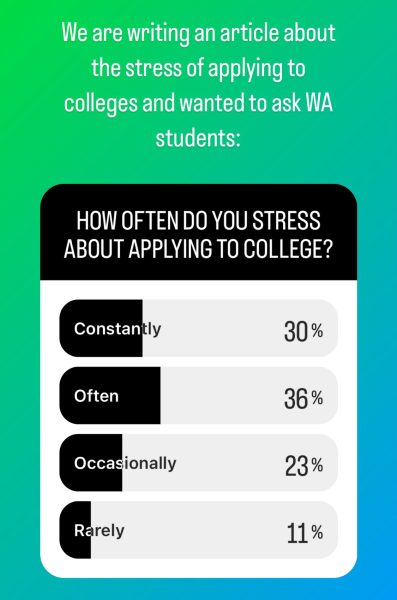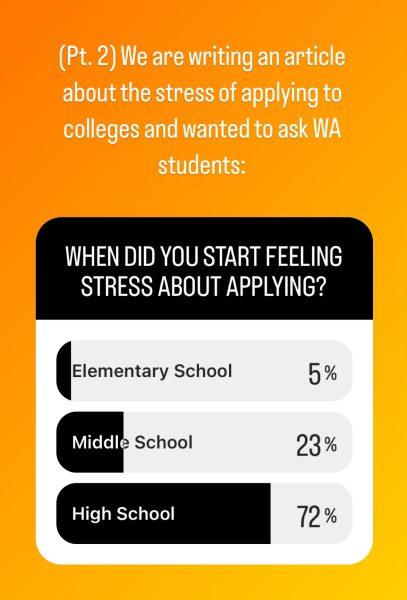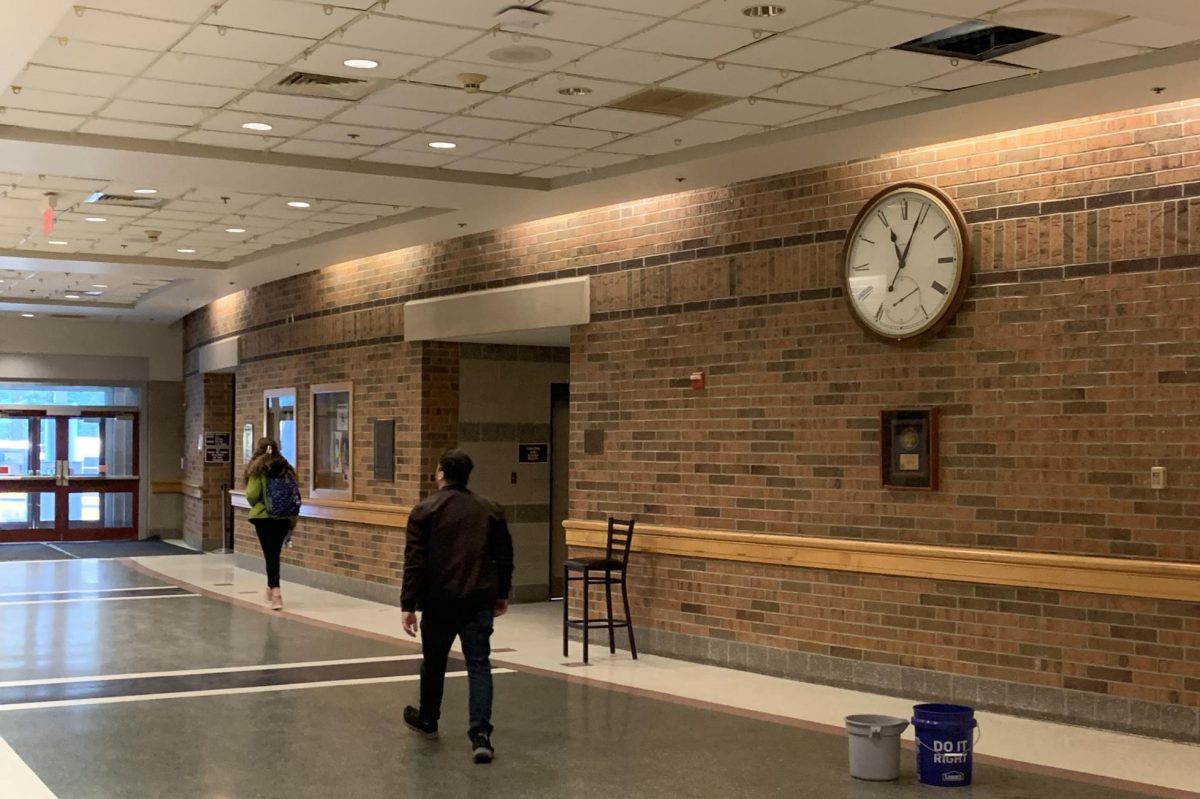College has been a worry in the back of my mind for as long as I have been attending school, and as I near the end of high school, discussions surrounding the subject have grown more unavoidable. The reason for the pervasiveness of the topic is no secret; college is a crucial period in the lives of students who choose to attend it. However, it often feels as if being accepted into a prestigious college is the be-all and end-all goal, making even the smallest mistakes feel as if they ruin the chances of a successful future.
Although worrying so much about higher education may seem dramatic, the importance of college is drilled into students’ heads at an early age and continues to weigh on their mind. By the time students near the end of high school, college seems like a nearly constant topic of discussion. It is important that the mindset and discussions which involve college acceptance change in order to prevent burnout and maintain a passion for learning among students. This change must involve a shift from the idea that college is the determining factor in fulfillment in adult life to a focus to college being a stepping stone to a deeper exploration of interests.
With more students currently applying to college than ever before, the intense focus on the formation and submission of applications feels overwhelmingly stressful and competitive. It’s common knowledge among students that it is not enough to just earn the best grades anymore. Instead, to be appealing to colleges’ holistic review of applications, students are encouraged to have numerous volunteering hours, as many extracurriculars as they can cram into their schedules, and leadership positions in multiple roles.

It’s easy to allow the processes and requirements associated with applying to college consume every thought, but as I’ve worked harder and harder to become a “well-rounded applicant”, I can’t help but wonder if the constant stress and devotion of energy is worth it.
For as long as I can remember, I’ve heard that college is the biggest step towards a happy, successful life; a sentiment that has been reinforced in my mind by TV shows, books, movies, classmates, and adults. The apparent necessity of receiving a degree from the best college possible has made me feel as if even considering stepping off the brake or reducing my workload will jeopardize my ability to accomplish my goals in the future.
It seems like every revolutionary scientist, every award-winning author, and every prominent politician has graduated from a highly competitive college, so if I want to be successful and well-regarded, being accepted into a prestigious university should be my primary focus. And while that thought process may sound ridiculous written out, the first impression most people have of someone who graduated from a highly-ranked university is that the person must be accomplished and remarkable.
Yet, with each sleepless night and hours spent worrying about grades, I’ve wondered why it seems as if I have to sacrifice so much of my time and happiness to a school which I’ll likely only be attending for about four years. According to a study done by Pew Research Center, 61% of teens surveyed reported to have felt pressure to earn high grades with most of those students planning on attending a four-year college. All of the constant stress and energy spent on maintaining good grades and balancing a heavy workload, extracurriculars, and a job or volunteering position leads to burnout and exhaustion for a significant number of students.
In addition to burnout and exhaustion, focusing solely on earning high grades and the impact those grades have on college acceptance can also lead students to lose their interest in learning for the sake of discovery and curiosity. Studies have displayed that student engagement decreases as they progress through their general education and are less motivated to fully invest themselves, which is a testament to how many students are just focused on getting the work done rather than expanding their understanding.
Instead of encourage students to just enroll in the hardest classes, is necessary to keep students engaged and enthusiastic while avoiding wasting time and energy on subjects in which they are uninvested. To prioritize this, students should be learning from a young age that passion for a subject isn’t determined by a grade, but instead by the amount of interest they have in the subject.
Colleges must also reduce their emphasis on rankings and their promotion of unhealthy competition. Although colleges are, at the end of the day, still businesses that require advertising to continue growing, the excessive attention directed towards the rank of the school just creates another aspect of college applications for students to obsess over.
Every time I hear about a college, I have the almost immediate impulse to check its ranking on U.S. News & World Report, and I often hear people mention and ask about the rank of a college soon after it is mentioned in conversations. With the resources many colleges devote to increasing their ranking, they continue to foster unnecessary levels of competitiveness and support the idea that their worth, and thereby their students’ worth, is determined by a rank.
Moreover, as students progress in their high school years, a greater emphasis should be placed on life after college, through events such as the Junior Job Shadow, and how success is still achievable at any point in life. Going to college immediately after high school is not the only option either, and more students need to hear that. Whether it be a gap year, going directly into the workforce, or attending a vocational school, it must be emphasized that the opportunity to pursue a higher education is open at any point in life. We, as a culture, as well as colleges should be more accepting of students taking a break after high school to reassess their goals or explore them further before college.

One relatively simple way to reduce the hyper focus on success in the upper grade levels and college would be to shift the way the reason for learning a topic is discussed. For example, many educators tell students that they are teaching a specific skill in order to prepare them to succeed at a higher grade level or in higher education. By also describing how learning the skill or topic is important for life in general or a future occupation, teachers would significantly decrease the focus on college as the main reason to work hard to learn something in school.
Although it may seem intuitive, simply hearing that constantly working at max effort is not the only way to achieve success is an important idea for students to hear as pressure ramps up.
Colleges must also factor into their application review process that a student taking harder classes for a topic they are interested in and involving themselves in related extracurricular opportunities are more important than taking every single class at the hardest level. Taking a variety of intense classes may demonstrate a student’s level of preparedness for a heavy workload and display a supposed variety of interests. However, it also leaves less time for genuine exploration of areas that students are interested in and generally should not be the deciding factor in the acceptance of a student.
In order to continue to motivate students and allow them to reach their full potential, it is important to acknowledge that small, and even large mistakes do not completely eliminate larger goals.
To reinforce this idea, a program could be offered in which students are able to retake courses that they did not fully succeed in during the school year. The course could be offered during break periods such as summer vacation or the time set aside for seniors for their capstone projects. By attending the retake courses, students would be able to fill in any missed information and receive another chance to succeed and find their passion for the subject.
Similarly to dual enrollment, this program could be displayed on transcripts to demonstrate to colleges that a student was willing to put in more effort to understanding a subject and has a genuine passion for it. The retake courses would thereby reduce the need many students feel to sacrifice sleep and stress themselves out to understand a subject during the already busy school year. Merrimack College offers college credit courses to pre-college students, but a program more similar to an Adult Learning Program for high school students could be more beneficial in providing willing students with the opportunity to fill gaps in their understanding of the course material.
Even more important, however, is the change in mindset that must take place. Students are more than just the grades they earn and the number of extracurriculars they take.
Although college applications, through necessity, largely force students to summarize their accomplishments in a few pages and measure their achievement with a few numbers, the strength of an application is not the only indicator of success. While applications include open response questions where students can describe the lessons they’ve learned and achievements that cannot be quantified, the few hundred words allotted are not enough to capture fours years of experiences. Growing as a person and learning the social skills necessary to interact with others maturely and professionally are also indicators of success and should not be undermined by the acceptance or rejection of an application.
Success should not just be measured by the reputation of the college someone attends, even though going to a good college seems to immediately correlate with an accomplished person. Life continues after high school, and in the end, hard work and investment in the goal being worked towards truly determines a person’s success. Although a college degree can be an indicator to employers of hard work as well, any degree shows a level of dedication, and maintaining the excitement to continue to learn makes it much easier to work towards goals and to create the best work possible.








